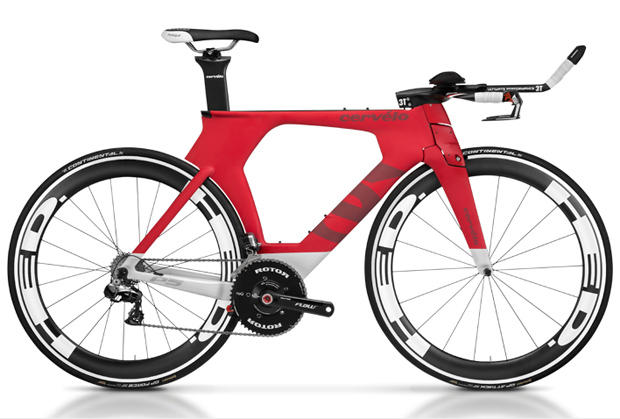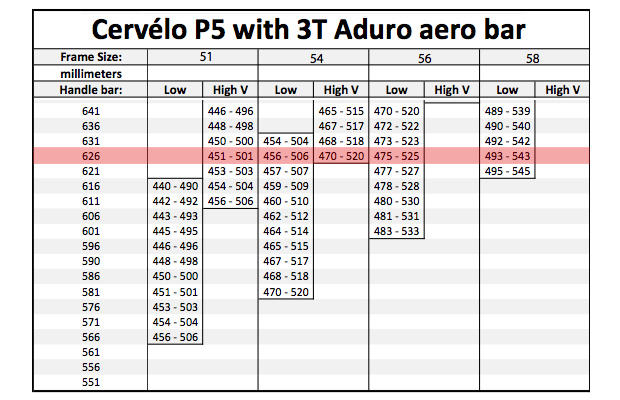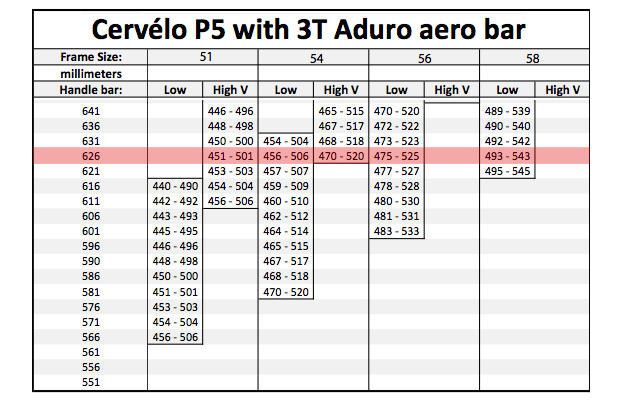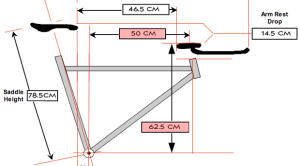One bike almost every serious triathlete considers before making his or her eventual purchase choice is Cervelo, and the flagship of the line is its P5. Most of the P5s I see have the built-in 3T Aduro aerobar and this configuration is called the P5 Six. The Aduro bar comes in two configs: the High-V and the Low.
Below we're going to determine exactly which is your best bike. Well, we're going to determine what my best P5 Six would be and I hope this exercise translates to you. Below is the P5 Six. Nice bike. In that pic the bike is configured with the 3T Aduro in its Low config.

In the image furthest below are the various ways to configure this bike for height. Well, mostly height. Note that the High V bar (the 2 images to the right) has armrests that don't just elevate but protrude forward. So, that High V config, all by itself, adds length to the position.
If you soldiered through yesterday's discussion of how I determined which Trek Speed Concept 9-Series bike is right for me, you know that there are 2 keys: First, determine what your proper position is; second, memorialize that position in writing by determining the X and the Y (horizontal and vertical) distances from the bottom bracket (where the crankset attaches to the bike) to the top of the armrest, the midpoint of the top of the pad.
Same thing here. Same basic system. If we do this, we end up with 2 numbers: Pad X (the horizontal distance from the BB to the pad center), and Pad Y (vertical distance). We then go to the chart that looks kind of like a Cartesian graph from high school geometry:

This is a horribly truncated table I'm offering above. A link to the full table is below. I have zoomed in on only the chart range that will refer to me. If you read yesterday's Trek installment you know that my Pad Y = 625mm and my Pad X = 500mm. I have shaded above, in red, the row that's for me. Note that my Pad X of 500mm is discoverable in 4 sizes of this bike: 51cm, 54cm, 56cm, and 58cm. Which one is my bike?
I can clearly fit aboard all of these 4 sizes. This now ceases to become a fit discussion and becomes a handling, and maybe an aerodynamic, discussion. But let's just think about the handling and stability issues because, for me, these trump what are probably relatively minor (to me) aerodynamic differences between these frame sizes when those differences are expressed in time at the end of the bike leg.

If you look at the chart above, under each size there are two columns, each column representing the handlebar config. Taking that 51cm size as an example, the bottom cell of the Low config means the Low aerobar with no pedestals. That's as flat, as low, as you can make that bike. My Pad Y = 625mm. I'm 6'2”. Let's say you're 5'7” and you have a Pad Y much lower than mine. If it's lower than 565mm you're not able to hit your position on this bike in this size. You'd need to go down a size, maybe 2 sizes.
The way this works is: If you ride a Pad Y of 570mm (Pad Y, or armrest height, are the numbers on the left hand column) and the 51cm P5 is the appropriate length for you, you'd ride the Low Aduro stem with a 5mm pedestal under the bar. If you rode 575mm of Pad Y you'd put 10mm of pedestal under the bar. You do this until you hit 50mm of pedestals under the bar and if you're still not high enough you move to the High V bar, again with no pedestals. If that's not high enough, you begin pedestaling the High V bar. You can see the front end configs above (reprinted from the P5's white paper).
Let's say you have a Pad Y = 600mm, and your Pad X = 475mm. You might not want 35mm of spacers under the Low Aduro. You could move up to the 54cm. Then you're riding the Low config with only 20mm of pedestals under the bar. But the 54cm is a little longer than the 51cm size. The pursuit bar is going to get pushed a bit in front of the BB. You'll have to reach a little more when you're in the pursuits. Because the front of the bike on the 54cm is pushed forward a bit versus the 51cm, you'll need to pull the pads pads back on their clamps (the bolts affixing the armrest cups to their clamps will pass through a more forward set of holes). You'll need to pull the extensions back a little. Is this good for you? It depends on whether you need the extra length in the pursuit position, and whether the extra wheelbase is better for you, or worse.
Remember, the pursuit position cannot be moved fore/aft on these bikes. It stays where it is, and it's the pads and extensions that move fore/aft. So, a part of your choice, when you have multiple sizes available to you, is where you want the pursuit bars to be, and this affects how the bike handles (you don't want the pursuits to close in, or too far out, you want them comfortably placed).
This is why I say these fit decisions now become handling decisions once you have multiple sizes aboard which you can fit. Handing and, perhaps, cosmetics (do you want more or fewer pedestals showing?).
So, my example. Remember, I'm 6'2". I'm reprinting the chart below so you don't have to scroll to refer to it.

Were I to ride the 51cm, yes, my 500mm of Pad X is achievable, but by 1mm. I'd have to ride the High V, with 15mm of pedestals under the bar, and push the pads out as far as they can go, likewise the extensions. The pursuit bars in this case would be back quite a bit. Probably too far back. I'd feel like I'm riding a kids bike when I'm in the pursuits.
Let's look at the 54cm. I could actually ride this bike. If you look, my 500mm of Pad X is right in the center of the range if I choose the High V config. It's not in the center with a heavily pedestaled Low config. Why? Remember, the High V is not just a taller config, but the pads sweep forward, adding length to the position.
Do I want this bike? This is when I start to look down near the bottom of the bike. This 54cm size has a front/center of 602mm. Front/center is the distance from the BB to the front wheel axle. That 602mm number is tight for me. It's rideable, I could ride it, but it's tight. Yesterday we all decided I was a good fit on a Trek Speed Concept in size Large. That bike in that size has a front/center of 624mm. I even consider that on the tight side, for me, but it's quite okay. I think I'd like to see if I can get a little broader base of support underneath me.

The 56cm in the Low config works for me, but with 25mm of pedestals. That's workable. My Pad X is also close to the center of the range. How can two sizes, apart in length by 14mm, each provide me with a Pad X that is right in the center of the range? Because the 54cm with the swept-forward High V config has a not dissimilar length as the 56cm with the unwept-forward Low config. The 56cm P5 has a front/center of 622mm, almost identical to the SC in size L.
I can also ride the 58cm, and it's got a nice, low config. Almost no pedestals under a Low Aduro bar. Almost every bike I ride is a 58cm, so this is enticing. But if you look at the Pad X, I'm now at the other end of the range. Now the bike is borderline too long in the cockpit. The front/center is 640mm, very nice, very stable, and probably what I'd prefer, all things equal. But I'm going to have to pull the pads back if I choose this size, pull the extensions back, but that won't pull the pursuit bars back – they'll stay right where they are, projected further in front of the BB than I'd like.
So, on balance I'd probably opt for the 56cm. What I'd really like is a 58cm with a pursuit bar that is not swept forward but, alas, most companies seem to be making their pursuit bars like this and it's hard to avoid. If you want to go through this exercise for yourself, here's the entire, untruncated chart.
That's the calculus when choosing a P5 Six. Notice how similar, in theme, to the way we chose the Speed Concept 9-Series?
Note that in both cases, for both bikes, where I have multiple sizes that can offer me the position I want, the two things I'm looking at are: 1) Where will the pursuit be, in space? Too high or low? Too far forward or too close in? And 2) What is the base of support underneath me? Is the front/center too short, and I feel like I'm riding a unicycle? Or is it too long and I feel like I'm riding a semi truck? That's why I say that these systems might be advertised as fit systems but when properly understand they are both fit and handling systems.
The BMC TM01 is sized the same way as the two examples I've shown you so far, and I'll show you that in the next installment. Likewise some other superbikes.
I'll go through these superbike sizing systems, and then I'll show you how we tackle mortal tri bikes.


